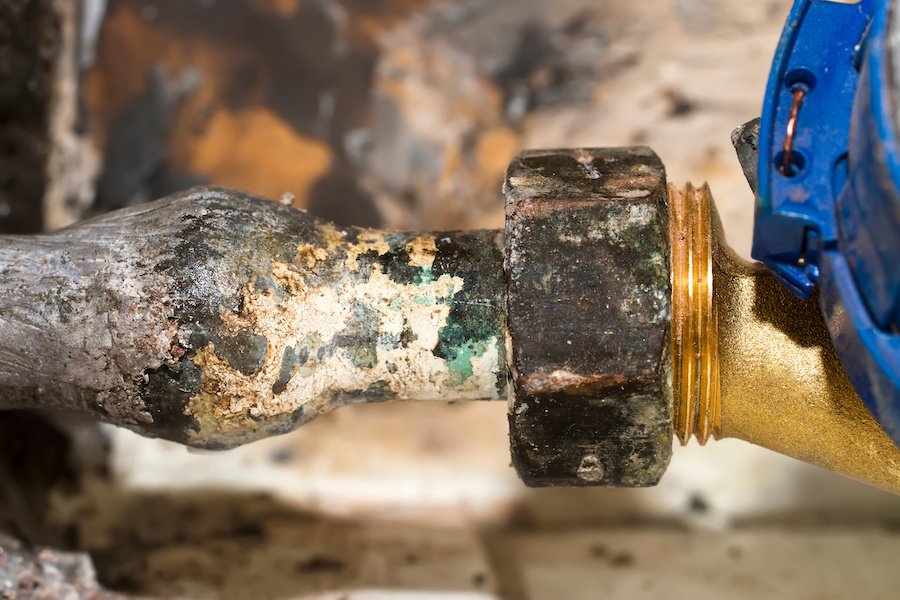By Helen Quinn Pasin
Audience discussions that follow One Earth screenings are meant to raise further awareness, but questions can arise that can’t always be answered on the spot. That’s exactly what happened on March 7. The five-minute film "Take Action Against Lead" by Young Filmmaker Contest winner Lion Birnecker touched a nerve in an audience full of activists wanting to know more about lead in water pipes and the dangers they pose. Film discussion panelist Delmar Gillus, Chief Operating Officer of Elevate, pointed us to his organization—and from there we did a deep dive into lead in our water systems.
The Lead Problem
Before Congress Amended the Safe Drinking Water Act in 1986, lead was used to make plumbing materials such as pipes. Lead from pipes can still enter drinking water today because of corrosion or wear of the heavy metal. The most significant contributor to lead contamination in drinking water is service lines connecting residences or buildings to the public water supply.
Corroded lead pipes. Screenshot from Lion Birnecker’s film “Take Action Against Lead.”
The Illinois Environmental Council states that no lead level in water is safe. Federal law does not require schools to test for and address neurotoxic lead in their drinking water. Illinois ranks higher than the national average for childhood lead exposure, which can lead to lifelong intellectual, emotional, and behavioral consequences, lower IQ, slowed growth, hearing problems, and anemia.
In 2021, Illinois Gov. J.B. Pritzker signed the Lead Service Line Notification Act, which mandated the replacement of lead service lines in Illinois. However, advocates argue that necessary action won't happen soon enough because final replacement plans aren't due until 2027.
In September 2022, The Guardian reported that one in 20 tap water tests performed for thousands of Chicago residents found lead at or above U.S. government limits. One-third had more lead than is permitted in bottled water.
Out of the 24,000 tests, approximately 1,000 homes had lead exceeding federal standards. An estimated 400,000 lead pipes supply water to homes in the city, and the vast majority were not tested as part of the program. The Guardian conducted the study with water engineer Elin Betanzo, who helped uncover the Flint water crisis that resulted in many, primarily Black residents, being poisoned by lead.
The analysis found nine of the top 10 ZIP codes with the most significant percentages of high test results were neighborhoods with majorities of Black and Hispanic residents. There were dozens of homes with shockingly high lead levels. One house, in the majority-Black area of South Chicago, had lead levels of 1,100 parts per billion (ppb)—73 times the Environmental Protection Agency (EPA) limit of 15 ppb.
The Lead Solutions: Water Testing
The Chicago Department of Water Management (DWM) encourages concerned residents to test their water and offers support. However, the City of Chicago has not provided an analysis of the recent concerning study done by The Guardian.
Elevate, a nonprofit organization headquartered in Chicago that works nationally is working to address the city's lead problems. Elevate provides childcare facilities with mitigation strategies to help minimize or eliminate lead in their water if lead is present through LeadCare Illinois. The nonprofit seeks to create a just and equitable world in which everyone has clean and affordable heat, power, and water in their homes and communities—no matter who they are or where they live.
LeadCare Illinois includes training about the dangers of lead, how to conduct lead testing, and what to do if lead is present in a facility's drinking water. After completing training, childcare providers receive a free lead-in-water test kit in the mail to collect water samples and send them to a lab for analysis. All LeadCare Illinois services are available in Spanish and English to equitably service Illinois childcare facilities.
In an interview with Chicago (WBBM Newsradio), Elevate CEO Anne Evens CEO expressed an urgent concern about the problem with lead in water, soil, and air in old homes. "So many of our homes and the home daycare provider spaces have lead-based paint. They also are likely to have lead service lines because, until 1986, the Chicago code required that lead be used in water service lines."
Evens said eliminating the neurotoxin would help the developing brain and raise IQs. She was awarded the $250,000 Heinz Award, which recognizes outstanding contributions to the arts, economy, and environment. "Our work creates healthier homes, saves people money, keeps the utilities on, and preserves affordable housing for people who need it most. After the past years of sheltering in place, it's especially important to address the public health challenges within housing. I'm grateful for the staff and partners who make this work possible," said Evens. The award will be used to continue testing children in daycare centers for lead and retrofit apartments with energy-efficient appliances and materials so tenants with limited income don't spend a disproportionate amount on utilities.
Elevate administers LeadCare Illinois in partnership with the Illinois Department of Public Health, Illinois Environmental Protection Agency, and Illinois Action for Children. Funding is provided in whole or in part by the Illinois Department of Public Health.
Elevate is not exclusive to Illinois. It also has offices in Oregon, California, Missouri, Wisconsin, and Michigan. Locate those offices here.
Find Certified Labs to Test Your Drinking Water for Lead. Certified laboratories for testing are available by contacting the state or local drinking water company.
Request a water test kit from the city of Chicago here.
Guide on how to self-test for lead here.

